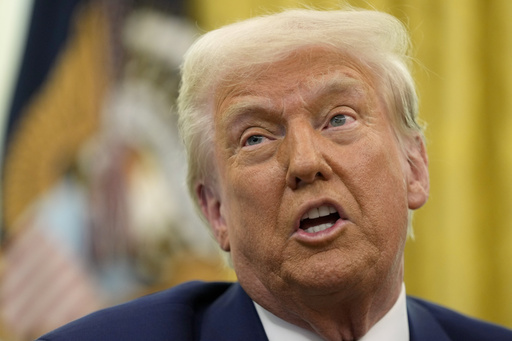
Officials in Washington, D.C. have long anticipated this moment: President Donald Trump has voiced his intentions regarding a possible federal takeover of the District of Columbia. In his second term, he has revisited this contentious subject, suggesting that Congress may need to intervene for this to happen.
This recent development surfaced amid numerous initiatives introduced since Trump’s inauguration on January 20. The president’s remarks have reignited discussions about his authority, yet it remains unclear if these comments signal a serious pursuit or are merely a reminder of the power he wields through casual commentary.
One pressing inquiry is whether such a takeover is feasible. The answer is yes, but Trump cannot enact this on his own. The Republican-controlled Congress could indeed pass legislation to annul the 1973 Home Rule Act, which permits D.C. to govern itself in many capacities. However, such a vote would likely be contentious, testing the strength of the current GOP majority in the House.
The reason behind Trump’s timing is somewhat enigmatic. D.C. Mayor Muriel Bowser has maintained a cooperative approach since Trump’s re-election, even visiting him at Mar-a-Lago to discuss mutual interests, including the return of federal workers to their offices. Following Trump’s remarks on Air Force One regarding their amicable relationship, Bowser highlighted the qualities of D.C. in a social media post.
In terms of what Trump can do without Congress, local leaders have speculated about potential executive orders that might heighten criminal penalties or crack down on homelessness. However, a comprehensive takeover still hinges on congressional approval. Trump could nominally assume control of the Metropolitan Police Department, an option previously explored during the nationwide protests in 2020 following George Floyd’s murder. Yet, such a move would require a clearly defined emergency, likely leading to legal challenges regarding the justification of the situation.
When considering the issues Trump raised, it’s important to note the fluctuations in crime rates. In 2023, D.C. saw notable increases in violent crimes like homicides and carjackings, which have since dropped significantly due to new public safety measures. Presently, crime is elevated slightly but remains substantially lower than in the late 1990s when D.C. had exceedingly high homicide rates.
Graffiti is a common sight in the city, though officials address it proactively by transforming graffiti artists into muralists. Homeless encampments exist in Washington, with challenges arising from many public spaces being under the National Park Service’s jurisdiction. This has led to periodic clean-ups of makeshift camps, establishing a somewhat cyclical pattern.
The history between Trump and D.C. has been fraught with tension. During Trump’s first term, he clashed with the local government over various issues, including a proposed military parade that was publicly ridiculed by the D.C. Council. Tensions peaked amid protests over police violence, where Trump remarked on Bowser’s management of the city, leading to symbolic actions such as the painting of “Black Lives Matter” on city streets.
Even after his presidency, Trump maintained a negative perspective on the capital, using his campaign activities to discuss the idea of federal involvement as a response to urban violence. His extreme criticism of D.C. resurfaced in August 2023 as he faced legal challenges, calling the city a “filthy and crime-ridden embarrassment.”
In Congress, Republican activists have utilized the House Oversight Committee to exert influence over D.C.’s governance, particularly during the recent crime surge. Congress has also intervened in local legislation, exemplified by its unprecedented repeal of a rewriting of the D.C. criminal code. Activist lawmakers often attach budget amendments to modify local laws, illustrating a trend towards more direct oversight.
Interestingly, there may be a glimmer of hope for D.C. officials who quietly believe that Trump and Congress are unlikely to want the responsibility of managing such a densely populated area. Although they anticipate various legislative riders from emboldened Republican members in response to Trump’s assertions, some experts doubt that Congress will fully commit to the extensive responsibilities that accompany a federal takeover. Legal implications of police accountability and other civic issues could deter congressional action.

